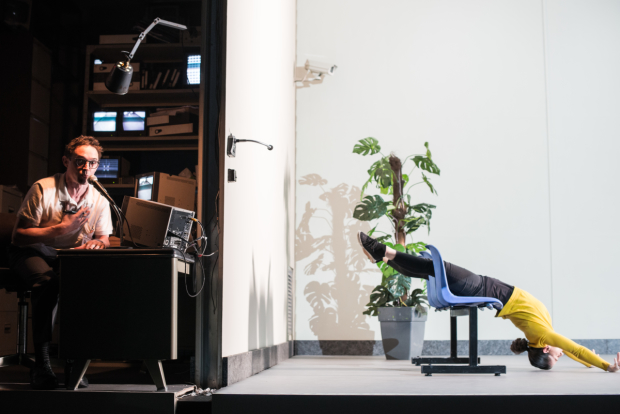Arlington
Enda Walsh fuses drama and dance in a dystopian work of art at St. Ann’s Warehouse.

(© Teddy Wolff)
Enda Walsh has never been one to sit two Irish lads at a bar and have them recapitulate their tortured pasts over a pint. In the world of Irish playwrights (and playwrights at large), he's known for reshaping theatrical molds — something New York City saw most recently in his mind-bending book for the David Bowie musical Lazarus, which premiered at New York Theatre Workshop just last season. But even that inscrutable project seems conventional in the wake of Arlington — a dystopian cocktail of theater, dance, and performance art that somehow still leaves you with the sweet taste of a love story.
Written and directed by Walsh, the play makes its American premiere at St. Ann's Warehouse (concurrently with his theatrical installation Rooms at Irish Arts Center). The production follows a world premiere with the Galway International Arts Festival where it picked up the adjective "Orwellian," a descriptor that suits its futuristic world of privacy- and identity-deprived captives. Isla (played by Charlie Murphy with a strength that eventually melts into vulnerable sensitivity) wanders familiarly around an all-white waiting room that holds three blue plastic chairs, surveillance cameras, a radio, and the same Swiss cheese plant that sits purposelessly in every known dentist's office. We're squarely in the middle of nowhere (clever and economical design by Jamie Vartan), but Isla is clearly accustomed to her sterile surroundings, as well as the voice that greets her everyday from the other end of the room's intercom system.
Only today, a different voice comes through the speaker. Now it's the voice of a younger man with noticeably quavering vocal chords (Hugh O'Conor, who radiates a genuine goodness beneath his paralyzing fragility). Under foggy circumstances, this young man has taken over the job of monitoring Isla and encouraging her to fabricate nice memories to fill in the details of a nonexistent past. He then enhances these stories with musical accompaniment and video projections that sprinkle these dreams with the essence of reality — something that's apparently a fixed part of the protocol.
Who or what has constructed such a system, we don't know, but what we can tell about this world is that the Irish pastime of casually sharing life stories with strangers at a bar is a distant dream. Isla and the young man, however, get to at least feign this ritual through the walls of her prison, and for a moment, we catch a whiff of a traditional romance couched in an extremely unconventional meet-cute. It's a testament to Walsh's talent for dialogue that we care so deeply about the connection between two strangers who have never met face-to-face and have no independent back stories to speak of.
It's also a testament to Murphy and O'Conor's performances that they’re able to nourish this subtle chemistry, as well as the charm and humor that Walsh embeds within such depraved circumstances. Arlington is a piece that rarely gives you anything solid to hold on to, so even when they don't share scenes, their relationship remains our primary foothold — particularly the ways in which they help (or try to help) each other escape this seemingly hopeless environment.
Not that you should spend all of Arlington waiting for traditional exposition to get your bearings. It's probably best if you surrender the idea of "getting your bearings" altogether and take in the sensory input as it comes. In fact, some of the most thrilling moments in Arlington come when the dialogue stops. The brilliant Oona Doherty is an explosion of raw energy in her 20-minute scene that she voicelessly spends dancing in fits and starts to Emma Martin's electrifying choreography. Set to Teho Teardo's original music, Arlington is at its theatrical peak in this segment, with sound designer Helen Atkinson, lighting designer Adam Silverman, and video designer Jack Phelan accompanying Doherty's athletic movement to create a visceral experience of suffocation and vertigo (the topsy-turvy shadows that appear on the walls are a visually stunning addition).
Considering that Arlington is Walsh's artistic response to recent political events, it's no wonder that much of it has spilled out in a wordless fury. He's built a horrifying society controlled by a "Big Brother"-like figure where creativity, identity, and independent thought are all suppressed. It's a dismal reflection of shadows that are forming outside the world's collective door — but the good news is that love seems to pave the road from complacency to freedom.








